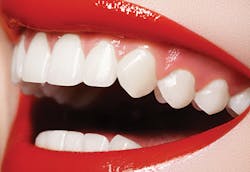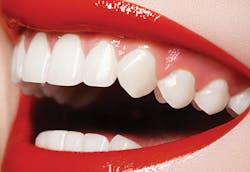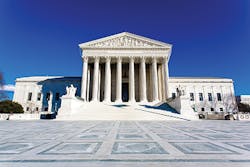Who is the dental board serving?
The government examines whether state dental boards protect consumers or dentists
BY Suzanne Newkirk, RDH, andLynne H. Slim, RDH, MS
The practice of tooth whitening began around 4,000 years ago with the ancient Egyptians who created a whitening paste using ground pumice stone mixed in wine vinegar. White teeth were a mark of beauty and a sign of wealth.
Ancient Romans whitened their teeth using urine. The ammonia in the urine was eventually discovered to be the bleaching agent.
During the 17th century, people relied on barbers for the care of their hair and teeth. To whiten teeth, the barber would file down the teeth and apply an acid. Although this practice made teeth whiter, it also eroded tooth enamel and led to decay.
Some 400 years later, tooth whitening has become one of the most popular cosmetic dentistry procedures offered in most dental practices - either as an in-office procedure or as a custom-made take-home kit. Following the popularity of the whitening boom, non-dentists eventually began offering tooth-whitening services at locations throughout the country in places such as mall kiosks, spas, retail stores, and salons. Although the techniques used by non-dentist providers are similar to those used by dentists to whiten teeth, the charge to customers is significantly less.
--------------------------------------------
Additional Reading Resources
- 3 online reasons patients are choosing a competitor's practice
- Grappling with Generation X
- Is your practice using social media to market to women?
--------------------------------------------
In North Carolina, dentists who performed tooth-whitening services began complaining to the state board of dentistry (BOD) about the provision of tooth-whitening services by non-dentists. These complaints often noted that non-dentist providers charged less than dentists, but rarely mentioned any public health or safety concerns. In response to these complaints, the NC BOD issued dozens of cease-and-desist letters to non-dentist tooth- whitening providers and distributors of whitening products and equipment. In addition, the board sent letters to mall owners and operators urging them not to lease space to non-dentist providers of tooth whitening services.1
In 2010, the Federal Trade Commission (FTC) brought a suit against the North Carolina State Board of Dental Examiners, stating that the board was motivated by financial self-interest when it sought to prevent non-dentists from offering cosmetic whitening treatments at cheaper prices. The U.S. Supreme Court has now heard the lawsuit, and the court's decision is expected by June 2015.
The Supreme Court said it took up the case to try to decide when a state licensing board "is regulating to serve the public interest and when it is acting to protect the private interests of its licensed members."
Almost all dental boards in the United States develop standards of professional conduct, including continuing education requirements to maintain a high level of integrity and performance in the practice of dentistry. However, according to FTC records a number of regulating dental boards have overstepped their authority by making decisions not to "protect the public," but to protect the special interest group they represent.
In 1914, President Woodrow Wilson created the FTC to control and monitor trade, and to protect consumers from anticompetitive business practices. The goal of the FTC is to balance the cost, quality, and accessibility of a product to create a fair market environment. This article examines some of the rules and regulations decided by a number of state dental boards and the impact those rules have, or have had, on the provision of dental hygiene services.
Dymple Johnson was one of the first "dental nurses" providing preventive dental services directly to the public in New England in 1883. By 1915, graduates from Fones School of Dental Hygiene in Bridgeport Connecticut were providing education and prophylaxis for school children, working in hospitals and public health settings without direct supervision of a dentist. Dentists soon realized the value of providing prophylaxis for their patients and began employing dental hygienists in private practice settings.
As the practice of dental hygiene became regulated by state dental boards, "direct access" for dental hygienists came to an end. By the mid-1970s and early 1980s only a handful of dental hygienists were providing dental hygiene services in settings such as private homes, dental hygiene clinics as independent contractors, and independent practices as sole proprietors. Although they often received support, encouragement, and patient referrals from previous employers, dental boards, dental associations, and individual dentists confronted the early pioneers, resulting in practice closures and costly legal challenges.2
The struggle for direct access
In 1981, the California Health Manpower Pilot Projects Program established pilot dental hygiene practices with a focus on increasing access to dental care. However, legal challenges delayed implementation of the program. But in 1986, 15 dental hygienists became certified in the program. Results showed that the dental hygiene providers "produced outcomes in both structural and process aspects of care that in many cases surpassed those available in dental offices, with no increased risk to the health and safety of the public.".3 Using the success from the manpower projects as a platform for change, Washington State became the first state in the nation to pass legislation allowing unsupervised practice by dental hygienists in health care settings. By 1995, Colorado, Michigan, and New Hampshire joined Washington in allowing unsupervised dental hygiene practice.
Numerous studies regarding scope of practice decisions cite references that "scope of practice decisions should be based on evidence." This notion is based on the principle that scope of practice decisions "be based on the demonstrated ability of various health care professions to deliver services safely and effectively and that some professions will have overlapping scopes of practice."4
The FTC has become concerned about dental boards that adopt overly broad scope-of-practice restrictions, or licensing restrictions to prevent competition for services. In September 2003, the FTC charged the South Carolina Board of Dentistry (SCBOD) with unlawfully restraining competition "by enacting a rule that required a dentist to examine every child before a dental hygienist could provide preventive dental care." The board claimed that its actions were immune from antitrust challenge under the state action doctrine. However, their argument was rejected in a commission opinion holding that the board's conduct was directly contrary to state law. In 2007, the SCBOD settled the charges that limited needy children from receiving access to dental care by restraining competition in the provision of preventive care provided by dental hygienists.5
In 2010, the Georgia BOD proposed a rule change that would have limited the ability of dental hygienists working for the Department of Public Health to provide basic preventive dental hygiene services without a "new requirement" for a prior examination by a dentist. The FTC intervened and expressed concern about "sound competition policy" stating, "... competition should be restricted only when necessary to protect the public from significant harm" and urged the board to reject the proposed amendments due to absence of clear evidence that dental hygienists providing services without direct supervision in safety-net settings have harmed or will harm patients.6
It has been noted that abuse of power frequently occurs when government empowers private parties to exploit licensing laws "to advance their own interests in restricting competition at the expense of public interest."7
In the 1980s and early 1990s, the FTC provided comments to state legislatures and dental boards in Texas, South Carolina, Montana, Tennessee, New Jersey, and other states regarding rules that limited the scope of practice of non-dentists, the relationships dentists may have with non-dentists, advertising constraints among dentists, and other competition-related concerns arising from proposed rules.8
The practice of dental hygiene is typically regulated under the authority of dental practice acts administered by governing dental boards in each state, even though accreditation standards for dental hygiene programs set forth by the Council on Dental Accreditation (CODA) are national in scope. This means that all accredited dental hygiene curricula must adhere to current standards provided by this council, which include cognitive, affective, and psychomotor skills necessary for the delivery of preventive, educational, and therapeutic services to the public.9
Dental boards are overwhelmingly composed of dentists and often make decisions based on practice issues and economics of private dental practices. As a result, dental boards frequently ignore dental hygiene concerns by limiting access to dental hygiene services because they have a vested self-interest in defining, regulating, and controlling dental hygiene practice.
Almost all scopes of practice and supervision requirements for dental hygienists mandate they work directly with dentists. These requirements are established by state law and include the procedures, supervision levels, and locations where dental hygienists may provide services. Depending on how they are written and implemented, scope of practice laws can either limit or promote access to care, thereby affecting the quality and cost of services.
In 2005, the American Association of Dental Examiners (AADE) appointed a Committee on Access, Licensure and Regulation to research and respond to access to dental care issues.
The committee recommended "state laws and regulations should impose supervision requirements on allied dental personnel commensurate with education and experience to ensure public protection." Further recommendations suggested that development of additional models to enable increased use of allied dental personnel may help ensure greater access to oral health care for Americans.10
Regardless of these recommendations, some state dental boards and their affiliate dental associations continue to stymie the efforts of state dental hygiene efforts to increase access to care via reduced supervision levels. This is especially true in the last five states in the nation that have yet to pass legislation to allow dental hygienists to practice without the direct supervision of a dentist. These laggard states are Hawaii, North Carolina, Mississippi, Alabama, and Georgia.
Dental boards in these states have steadily or consistently ignored the AADE recommendations on supervision levels, even though the Committee Position Statement says that dental boards should "be eager to standardize the definitions of professional practice, supervision, and other matters that facilitate regulation."10 For example, since 1992 the Georgia BOD has had the authority to delegate administration of local anesthesia to dental hygienists for pain management. But they have chosen not to do it, even though local anesthetic administration is a delegated duty found in 44 states throughout the county.
Having no evidence to support the restrictions placed upon dental hygienists from expanding care to the public, federal and state agencies are beginning to scrutinize the rules and regulations implemented by state dental boards. HRSA, the primary federal agency responsible for improving access to health services for the underserved is exploring ways to improve access to oral health care by expanding the oral health work force. A 2014 report from the National Governors Association recommends more be done to allow dental hygienists to fill the role of accessing low-income populations in need of preventive and therapeutic dental hygiene services by allowing them to practice to the full extent of their training and education.11
Other agencies such as the Institute of Oral Medicine and National Research are looking at changing funding and reimbursement levels for care provided by dental hygienists. As of 2014, sixteen states have changed laws to allow dental hygienists to be directly reimbursed as Medicaid providers. Those states are Arizona, California, Colorado, Connecticut, Maine, Massachusetts, Michigan, Minnesota, Missouri, Montana, Nebraska, Nevada, New Mexico, Oregon, Washington, and Wisconsin.
Despite this broad support, however, the United States continues to lag behind much of the rest of the world in providing better access to dental professionals for one reason - opposition by organized dentistry.12
Fones' vision for dental hygienists was one that included direct public access. In the early 1900s, his plan was twofold. Not only did he want dental hygienists to work in private dental practices, he was also committed to providing outreach services to those who could not afford private dental care. Increasing access to oral health care was already in the works because Fones and his hygienist, Irene Newman, instilled in their students the benefits of private and public health dental hygiene.13
The resistance of state dental boards to lift overly restrictive practice acts and supervision levels for dental hygienists to protect the public from harm makes one wonder: Who's protecting whom? RDH
Suzanne Newkirk, RDH, received her dental hygiene degree from the University of Alaska, Anchorage, in 1981. A recognized key opinion leader in dental endoscopy, Suzanne has published numerous articles on DentistryIQ.com, and has co-authored several dental textbook chapters on minimally invasive nonsurgical periodontal therapy with use of the dental endoscope: "Minimally Invasive Periodontal Therapy: Clinical Techniques and Visualization Technology" by John Wiley & Sons, Inc., 2014, and "Dental Hygiene: Application to Clinical Practice," publication date 2015. Ms. Newkirk is as a Perioscopy Instructor and professional speaker who has presented all over the nation for doctor and dental hygiene study clubs, as well as many large dental meetings. Suzanne is the owner and moderator of the Perioscopy Users Forum on LinkedIn.
LYNNE SLIM, RDH, BSDH, MSDH, is an award-winning writer who has published extensively in dental/dental hygiene journals. Lynne is the CEO of Perio C Dent, a dental practice management company that specializes in the incorporation of conservative periodontal therapy into the hygiene department of dental practices. Lynne is also the owner and moderator of the periotherapist yahoo group: www.yahoogroups.com/group/periotherapist. Lynne speaks on the topic of conservative periodontal therapy and other dental hygiene-related topics. She can be reached at [email protected] or www.periocdent.com.
References
1. In the Matter of THE NORTH CAROLINA BOARD OF DENTAL EXAMINERS Docket No. 9343. Opinion of the [FTC] Commission
2. Doreen Naughton, RDH, BSDH. Choice, Challenge, Change - Providing Direct Access Care
3. Freed JR, Perry DA, Kushman JE. Aspects of quality of dental hygiene care in supervised and unsupervised practices. J Public Health Dent. 1997;57(2):68-75. Spring
4. Changes In Healthcare Professions' Scope of Practice: Legislative Considerations. National Council of State Boards of Nursing, Inc. (NCSBN) National Council of State Boards of Nursing, Inc. (NCSBN) Related resource information: www.ncsbn.org/NursingRegandInterpretationofSoP.pdf
5. FTC Charges South Carolina Board of Dentistry. Agency Alleges Illegal Actions Deprived Children of Preventive Dental Care September 15, 2003 http://www.ftc.gov/news-events/press-releases/2003/09/ftc-charges-south-carolina-board-dentistry
6. FTC Staff Comment Before the Georgia Board of Dentistry Concerning Proposed Amendments to Board Rule 150.5-0.3 Governing Supervision of Dental Hygienists. http://www.ftc.gov/policy/policy-actions/advocacy-filings/2010/12/ftc-staff-comment-georgia-board-dentistry-concerning
7. George Leef. The Latest Case of An Interest Group Using Regulation To Stifle Competition: Teeth Whitening. http://www.forbes.com/sites/georgeleef/2014/08/13/the-latest-case-of-an-interest-group-using-regulation-to-stifle-competition-teeth-whitening/
8. FEDRAL TRADE COMMISSION. Regulating the Professions: The Intersection of Competition and Consumer Protection Policies. Gustav P. Chiarello Attorney Advisor Office of Policy Planning Federal Trade Commission
9. Accreditation Standards for Dental Hygiene Education Programs. Commission on Dental Accreditation American Dental Association 211 East Chicago Avenue Chicago, Illinois 60611 312/440-4653 www.ada.org Effective January 1, 2013
10. Access to Care: The Role Of the State Dental Board In Public Access to Oral Health Care. The Report of the AADE Committee on Access, Licensure and Regulation Cynthia M. Riffle, DDS, Chair; Mark L. Christensen, DDS MBA; Ms. Judith Ficks; Catherine L. Gatewood, RDH; Guy S. Shampaine DDS; Albert H. Guay, DMD; N. Karl Haden, Ph.D; Ms. Molly Nadler.
11. 2014 NGA Paper: The Role of Dental Hygienists in Providing Access to Oral Health Care
12. States Finally Taking Action to Improve Access to Critical Dental Care. Wendell Potter. 07/09/2014 5:59. http://www.huffingtonpost.com/wendell-potter/states-finally-taking-act_b_5295414.html
13. http://www.cdha-rdh.com/home/historyofdentalhygiene.html




